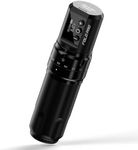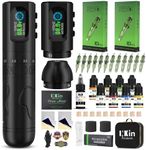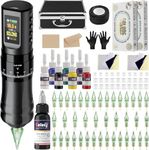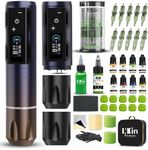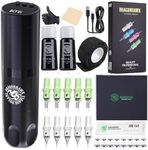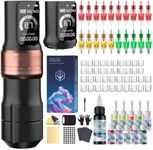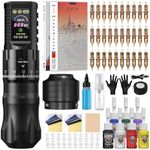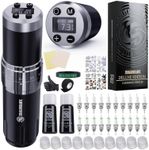Buying Guide for the Best Tattoo Machines
Choosing the right tattoo machine is crucial for both beginners and experienced tattoo artists. The right machine can make a significant difference in the quality of your work and your comfort while tattooing. When selecting a tattoo machine, consider the type of work you plan to do, your level of experience, and the specific features that will best support your style and technique. Understanding the key specifications of tattoo machines will help you make an informed decision that aligns with your artistic goals and needs.Type of MachineTattoo machines generally come in two main types: coil and rotary. Coil machines are traditional and known for their power and precision, making them ideal for lining and shading. They are often preferred by experienced artists who appreciate the control they offer. Rotary machines, on the other hand, are quieter and lighter, making them easier to handle for long sessions. They are versatile and can be used for both lining and shading. If you're a beginner, a rotary machine might be a good starting point due to its ease of use and versatility. However, if you have specific needs or a particular style, you might prefer the precision of a coil machine.
WeightThe weight of a tattoo machine can significantly affect your comfort and control during tattooing sessions. Heavier machines, often coil types, can provide more stability but may cause fatigue during long sessions. Lighter machines, typically rotary, are easier to maneuver and can reduce strain on your hand and wrist. If you plan to work on large pieces or have long sessions, a lighter machine might be more comfortable. However, if you prefer the feel and control of a heavier machine, you might opt for a coil machine despite the weight.
AdjustabilityAdjustability refers to how easily you can modify the machine to suit different tattooing needs, such as changing the needle depth or speed. Machines with high adjustability allow for more versatility and can be adapted for various styles and techniques. This is particularly important if you plan to work on a wide range of designs or if you are still exploring your style. If you are a beginner, look for a machine that offers easy adjustments to help you experiment and learn. Experienced artists might prefer machines with specific adjustments that align with their established techniques.
MaterialThe material of a tattoo machine affects its durability, weight, and feel. Common materials include aluminum, steel, and brass. Aluminum machines are lightweight and resistant to corrosion, making them easy to handle and maintain. Steel machines are heavier and more durable, offering a solid feel and stability. Brass machines are also durable and provide a unique aesthetic appeal. Consider the balance between durability and weight when choosing a material. If you prioritize a lightweight machine, aluminum might be the best choice. For those who value durability and a solid feel, steel or brass could be more suitable.
Motor PowerMotor power determines the machine's ability to drive needles into the skin efficiently. A more powerful motor can handle larger needle groupings and thicker skin, making it suitable for bold lines and color packing. Machines with less power are better suited for fine lines and delicate shading. If you plan to work on intricate designs or have a lighter hand, a machine with moderate power might be sufficient. For larger, more complex pieces, or if you prefer a faster workflow, a machine with higher motor power would be beneficial.
